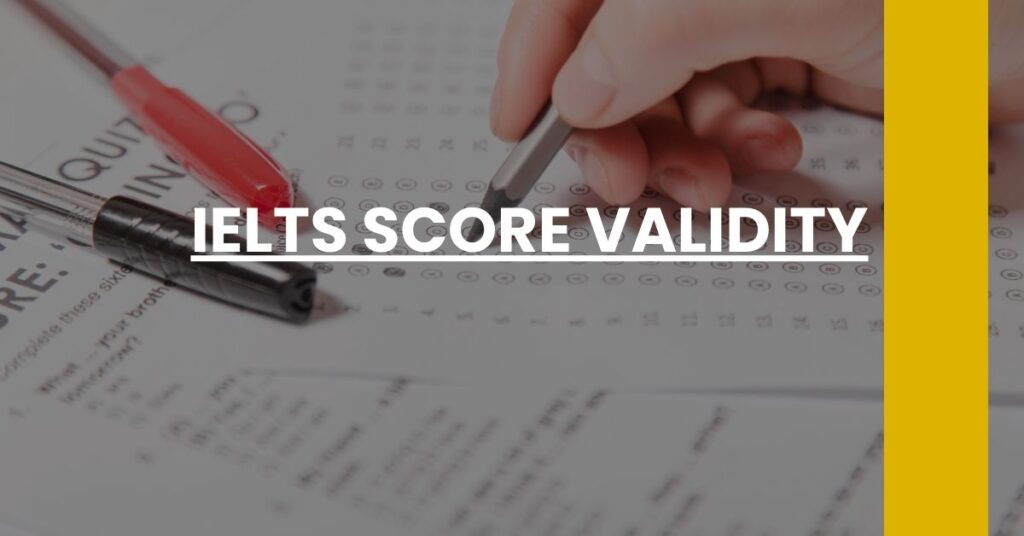IELTS scores are valid for a standard period of two years from the test date.
If you’re inquiring about IELTS score validity, that’s the straightforward answer. However, this expiration date is crucial for anyone applying for higher education, professional opportunities, or immigration.
Read on to uncover:
- How institutions recognize IELTS score validity
- The fact that IELTS scores can’t be extended under normal conditions
- The importance of the validity timeline in your planning
With this guide, you’ll navigate your next steps with confidence, ensuring your IELTS results align perfectly with your aspirations.
- Introduction to IELTS and Its Scoring System
- IELTS Validity Period Explained
- Factors Influencing IELTS Score Validity
- Recognizing the IELTS Score Validity by Institutions
- Extending the Shelf-Life of Your IELTS Results
- Importance of Planning Ahead with IELTS Validity
- Consequences of an Expired IELTS Score
- Renewing Your IELTS Certification: What You Need to Know
- The Impact of IELTS Score Validity on Different Visa Categories
- Conclusion: Making the Most of Your IELTS Score’s Validity
Introduction to IELTS and Its Scoring System
The International English Language Testing System (IELTS) is a standardized test that measures your proficiency in English—whether you dream of pursuing higher education, advancing your career, or migrating to English-speaking countries. The sheer impact of your IELTS score can alter the trajectory of your life’s journey.
Your test is scored on a band scale of 1 to 9 across four sections: Listening, Reading, Writing, and Speaking. Picture this as a finely tuned orchestra—with each section contributing its unique melody to form a harmonious overall score that resonates with institutions and authorities worldwide. Each band corresponds to a certain level of English competence, and crucial decisions are often hinged on the numerical whisper of these marks.
The Significance of A Band Score
Let’s delve into the significance of your band score. For example, a band score of 7 typically connotes a good command of the language, likely doors will swing open for you in universities or employment landscapes.
An elevated score not only reflects your linguistic prowess but also your ability to adapt and thrive in English-speaking realms. It’s the testament to your dedication that gleams brightly on your applications.
As your guide, let us embark on a journey to unravel the nuances of IELTS score validity—the topic at the heart of your aspirations—and optimize the use of this potent tool in carving your path forward.
IELTS Validity Period Explained
Understanding IELTS score validity is akin to realizing the shelf-life of perishable goods; except here, the diminishing product is your hard-earned score—a passport to your dreams, valid for a golden period of two years from the date of your result. Why this exacting timeframe? It’s all rooted in the principle of language ‘attrition’—the subtle, yet inevitable erosion of language skills over time.
Why Two Years?
Two years stand as a symbolic doorway, beyond which your language skills may have shifted, evolved, or waned. This temporal boundary is an assertion by IELTS authorities ensuring that the score you present is as fresh and reflective of your current abilities as possible—a credibility they staunchly uphold.
So, if you find yourself on the cusp of the two-year mark, with your IELTS score in hand, its lingering spirit urging you to step through impending thresholds, heed its silent prompt. Your future endeavors beckon for the taking, within the realm of this crucial timespan.
Factors Influencing IELTS Score Validity
When grappling with the nuances of IELTS score validity, there can be some leeway, albeit limited. Imagine, for a moment, a world where every institution shares a standardized view of how long your IELTS score remains applicable — but this isn’t quite the case.
Considering the Intended Use
Different institutions and organizations, each with unique missions, view the permanence of your IELTS score through diverse lenses. For some, the unwavering two-year rule is law; for others, your score’s relevance may be extended or contracted based on their internal policies or the ever-changing dynamics of language proficiency standards.
Reflect on your goals: Are you journeying towards academic, professional, or immigration horizons? The validity of your score might just stretch or shrink in the light of your specific intentions.
Recognizing the IELTS Score Validity by Institutions
As you wave your IELTS scorecard, remember that universities, corporations, and immigration authorities each enact their own chorus regarding its validity. They rig their lenses to zoom in on your scores, measured against their own yardsticks of IELTS score validity.
Higher education institutions may call for recent scores to assure your smooth sail through academic waters. Corporations often seek a tangible proof of proficiency, a fresh score giving them confidence in your communicative capabilities. Meanwhile, visa applications put your IELTS result under a microscope, dissecting its age to determine your linguistic fitness for new shores.
Gravitating towards these entities involves making sense of their agreements or discrepancies regarding the two-year rule. Your score’s destiny intertwines with their perception of its pertinence; it’s a linguistic dance you and the institutions partake in.
Contemplating your score’s voyage through the tapestry of these paradigms can be overwhelming. Yet, armed with discernment, you can navigate the validity terrain with agility.
Extending the Shelf-Life of Your IELTS Results
While the prevailing wisdom is that IELTS scores are enshrined in a two-year validity period, the realm of immigration conjures exceptions. In special circumstances, your score may enjoy an extended lease on life.
Consider the United States’ VisaScreen process—a magical wand that, when waved, blesses your IELTS results with up to a three-year augmentation, exclusively for visa exigencies. This is a rare, yet beneficial quirk in the system for those eyeing the American horizon for their professional journey.
Nevertheless, steer clear of the mirage that is ‘score extension’ for general use. Your score’s fate is imprinted in the sands of time—one must tread the path of reevaluation, a fresh display of linguistic splendor, once the initial two-year glow fades.
With persistence and timely action in rekindling your score’s vitality, the continuous pursuit of your global aspirations is indeed achievable. Let this illumination of the possibility of IELTS score longevity guide you through tactical decisions in your quest.
Embrace the unfolding chapters of your IELTS voyage with poise, with every passage upholding a steady gaze towards the fertile horizons your score promises.
Importance of Planning Ahead with IELTS Validity
When it comes to harnessing the full potential of your IELTS score, foresight is your ally. Remember, your IELTS score isn’t just a number—it’s a ticket to new beginnings. The validity period of your IELTS results should be accounted for in your educational and professional roadmap, much like a passport expiration date in your travel plans.
Here’s why strategic planning is critical:
- Academic Deadlines: Universities often have fixed application cycles. Aligning your IELTS validity with these can be the difference between an acceptance letter and a missed opportunity.
- Job Opportunities: Employers value current proficiency levels. A valid IELTS score can be the ace up your sleeve in a competitive job market.
- Visa Regulations: Immigration processes are stringent. A lapse in IELTS score validity might lead to delays, or worse, rejections.
By considering IELTS score validity in your planning, you avoid the pitfalls of unexpected retesting and the potential derailment of your ambitions. Knowing when your score reaches its expiration can save you precious time and energy—it’s an insurance policy for your future.
Consequences of an Expired IELTS Score
An expired IELTS score can unravel the threads of your aspirations. You’re standing at the gates of a university, a job contract, or a visa application. But the gatekeepers—admission officers, HR managers, or immigration officials—seek evidence of your current language abilities. An outdated scorecard simply won’t suffice.
If you find yourself with an expired IELTS score, know that your journey isn’t over, but you are looking at a detour. You may need to:
- Retake the Test: Investing more time, resources, and effort into repreparation.
- Postpone Plans: Pushing your timeline back, which might affect other life plans.
- Change Course: Reconsidering your options; perhaps a different path or destination that doesn’t require an updated score.
Avoid these scenarios: Keep a diligent eye on the IELTS score validity and how it aligns with your timeline. More information about the consequences can be found here for those targeting academic pursuits.
Renewing Your IELTS Certification: What You Need to Know
Unlike a library book, your IELTS score cannot be renewed or extended once expired. Think of it more as a perishable item that needs to be fresh when presented. If your score is nearing its end, you have no alternative but to re-enter the examination room, refreshed and ready.
Revitalize your IELTS preparation:
- Understand the Test Format: Iron out any confusion about test rules and question types.
- Practice Strategically: Prioritize areas where you can improve the most.
- Stay Informed: Keep abreast of any test changes that may have taken place since your last sitting.
As daunting as it may sound to go through the process again, many find their second experience smoother, armed with firsthand knowledge of the test’s rigors. Re-taking the IELTS can be seen as an opportunity for personal growth. Discover more about the renewal process on the California Board of Registered Nursing FAQs.
The Impact of IELTS Score Validity on Different Visa Categories
IELTS score validity wields a significant influence on visa applications. Different visas and countries have unique requirements, but they all have one commonality—your English proficiency must be proven with a valid IELTS score.
Taking the case of Australia, your IELTS results are pivotal for immigration, often weighed in a points-based system that meticulously sifts through applicants’ qualifications. Conversely, if you’re eyeing Canada, the validity becomes a critical component in determining your eligibility for permanent residence.
What this means is:
- Work Visas: They might have different validity requirements based on the job or country.
- Student Visas: Institutions may stipulate a current IELTS score for entry.
- Permanent Residency: Some countries integrate IELTS scores into their selection criteria.
Navigate these nuanced visa landscapes with your valid IELTS score as your compass. Uphold its clarity and currentness as vital for your migration journey. Interested in the specifics of Australian and Canadian immigration? More information is available here for Australia and here for Canada.
Conclusion: Making the Most of Your IELTS Score’s Validity
In essence, your IELTS score is a beacon, signaling your readiness to engage with the world in English. Its validity period is the flame that burns brightly but not indefinitely. Be the diligent keeper of this flame, ensuring its light shines when and where you need it most.
To maximize the value of your IELTS results, you must become adept at timeline management, savvy with procedural requirements, and resilient in the face of potential retakes. Approach your IELTS score validity with the respect it deserves—a valuable commodity in the global market of opportunities.
Remember:
- Your score is a reflection of your current ability.
- Institutions place a premium on up-to-date scores.
- Planning is paramount to ensure the validity aligns with your life’s agenda.
By embracing the insights provided, you can wield your IELTS results with confidence and precision, paving the way for a future rich with potential. The power of your IELTS score is immense, but its influence is bound to its expiry date. Navigate it wisely, for it is the key to unlocking doors across the globe.
IELTS score validity is crucial; know the two-year limit for study, work, or migration, and plan test dates accordingly.

